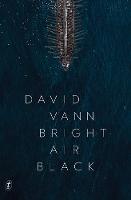Book Review: Bright Air Black, by David Vann
"Her father a golden face in darkness … face of the sun, descendant of the sun. Betrayal and rage.” So begins David Vann’s Bright Air Black,
a creative interpretation of classical Greek figure Medea and her life
of extremes: betrayal, rage and the symbolic sun all feature strongly
throughout.
 Vann’s poetic title comes from Robin Robertson’s translation of Euripides’ Medea,
which was actually written 800 years after Medea and Jason’s historic
journey in the Argo: “When mortals hope, the gods frustrate./From our
dull lives and loves they make/an unexpected passion play./They turn the
bright air black …” For those familiar with the Euripidean classic,
Vann notes that his own text is set 3,250 years ago ‘following the
archaeological evidence and never straying from realism.’ This means
that magic portrayed here is less ethereal and surreal: Medea’s
servitude to Hecate and her intelligent sorcery around the betrayal of
another King, Pelias, feels rooted in human behaviour and realism.
Vann’s poetic title comes from Robin Robertson’s translation of Euripides’ Medea,
which was actually written 800 years after Medea and Jason’s historic
journey in the Argo: “When mortals hope, the gods frustrate./From our
dull lives and loves they make/an unexpected passion play./They turn the
bright air black …” For those familiar with the Euripidean classic,
Vann notes that his own text is set 3,250 years ago ‘following the
archaeological evidence and never straying from realism.’ This means
that magic portrayed here is less ethereal and surreal: Medea’s
servitude to Hecate and her intelligent sorcery around the betrayal of
another King, Pelias, feels rooted in human behaviour and realism.Medea is a rich imagining as a character; Vann writes her in a way that captures the complexity of the human condition and the dichotomies we all have and live with. At once brutal and sensual; loving and hating; gentle and rage-filled, Medea is both godlike and fundamentally human at her very core.
Vann has rich material to work with, but he also has a wicked imagination and uses this creativity to access dark places. The book opens with Medea slowly and deliberately tossing parts of her dismembered brother’s body overboard as Jason’s boat – the classically famous Argo – makes its way slowly away from Medea’s pursuing father and her homeland. This visceral treachery continues over 100 pages. The slow release of her sibling’s mortal flesh is vividly described – ‘Medea takes a piece of her brother, a thigh, heavy and tough, muscled, and licks blood from it, dark and thick.’ – until, finally, ‘she levers the spoon beneath while grabbing his shoulder with her other hand, peels him back finally, and is able to roll him overboard.’ Other gloriously vivid descriptions include: ‘misshapen lumps adhered to the wood’ and ‘a rotted heart liquified. The spoon emerging shiny with drool’. Medea’s murder of her brother is paid for by the reader in absorbing the length and constancy of these relentless descriptions.
Jason is portrayed here as a bit of a wimp, really. He lets Medea down several times throughout the book – betrayals – most obviously at the end, when she experiences total rejection. But perhaps she doesn’t think much of him either: ‘Young and muscled and false, not to be trusted, but he is beautiful and he is all she has.’ She, in turn, has betrayed her father, brother and homeland and thus has limited choices.
Vann uses sentence fragmentation consistently and with force throughout the text. Whilst at first this feels jarring, eventually it creates a rhythm that echoes the fragmented journey of the Argo and the doomed relationship between Medea and Jason. Coupled with first person narration, it also maneuvers the reader towards a state of claustrophobia; this is relentless and confrontational and really well done.
The end of the book is a fitting one. In utter chaos and climax, and with a mouthful of blood manifested in the most shocking of ways, Medea ‘lurches forward and sprays the air to turn it dark. Bright air black.’ And so it ends as it starts, a story cycle of death, despair and escape. Vann has written a doozy of an interpretation here, and one which challenges a reader’s perception of both right and wrong and concepts of good and evil. For, in the end, despite her murderous ways, Medea still feels like a heroine in this story. Just a really violent, complex one.
Reviewed by Lara Liesbeth
Bright Air Black
by David Vann
Published by Text Publishing
ISBN 9781925355208

No comments:
Post a Comment